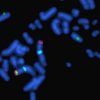Genomic plasticity and somatic DNA transposases and nucleases in developmental cancers
Half of the human genome originates from mobile DNA elements, or transposons, but their contributions to human disease and physiology remain largely unexplored.
Our studies are focused on evolutionarily conserved and developmentally regulated domesticated DNA transposase-derived genes in humans, including their molecular biology, normal physiologic functions, and aberrant activities in human cancer. This work is predicated on the hypothesis that young-onset human cancers originate from the aberrant activities of domesticated transposase-derived genes and other nucleases. We aim to define the spectrum of their enzymatic activities, cellular targeting factors, regulatory functions, and genomic targets that include essential tumor suppressor and oncogenes. In particular, we recently discovered that PGBD5 is a domesticated DNA transposase that functions as an oncogenic mutator to promote site-specific genome rearrangements in childhood and young adult human solid tumors.
This has led to a new hypothesis in which defects in developmental somatic genome remodeling cause mutations that explain many early onset cancers in children and adults. Recently, we showed that Pgbd5 is required for childhood tumor development in vivo, as most Pgbd5-deficient mice are protected from medulloblastoma development. PGBD5 is a transposase-derived gene and its somatic mutagenesis offers a genetic mechanism for site-specific DNA rearrangements in young-onset solid tumors, including small cell carcinomas, neuroblastomas, Ewing sarcomas, rhabdomyosarcomas, and many other young-onset cancers that express PGBD5.
Although we focus on the transposase-derived PGBD5 in initial studies, we propose that the principles and implications of somatic developmental mutators extend beyond cancer development. It is easy to imagine how similar molecules can provide molecular mechanisms for somatic genetic diversification during normal tissue development, and when dysregulated, cause somatic mutations which are increasingly being discovered as causes of sporadic human diseases.
Current projects leverage functional genomic tools for the investigation of somatic DNA rearrangements and genomic plasticity, providing functional insights into the natural history of tumor origins, evolution, and therapy response. Using single-molecule and single-cell genome sequencing, we are charting somatic genome structural variation in normal and cancer cells. Using chemical proteomics, we are defining cellular nuclease complexes and their regulatory factors, with an emphasis on translating these findings into rational targeted therapies for patients. Using pharmacologic approaches, we develop synthetic lethal and combination treatment strategies to develop precise therapies and advance them to clinical trials for patients.
In concert, we are investigating the mechanisms of developmental mutator-induced tumorigenesis in vivo using inducible and conditional transgenic mouse models, with a focus on the relationship between aberrant regulation of chromatin structure and developmentally controlled somatic genomic rearrangements in human cancers and childhood cancers in particular.



